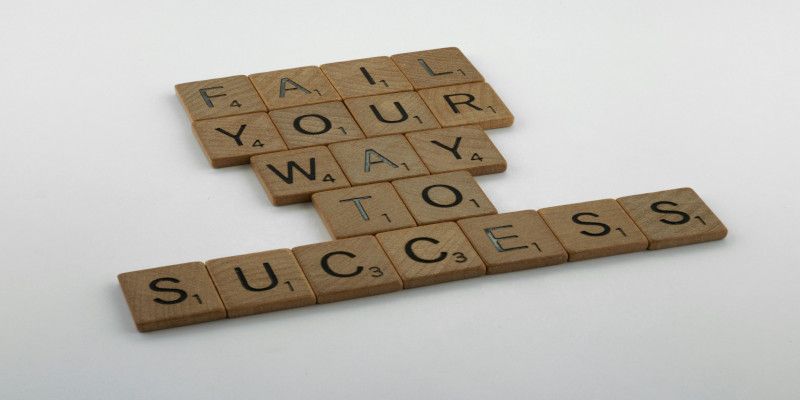Table of Contents
ToggleWhy we need failure to become successful
Some people view failure as the end of the world. As something, they can’t possibly live down, or recover from.
Prospering people know that foundering is inevitable and even required to become competent at whatever goal they decide to pursue. That’s because failure teaches success in many instances. Here’s why:

Every failure is a step closer to success
Think of it this way: Every failure is a step closer to success because you’ll find out what doesn’t work, which means you can eliminate those things that don’t function in the process.
Multiple nonaccomplishment just means getting to know what doesn’t operate, and what you’re doing wrong or poorly. This will lead us to the correct path to success over time.
Most people are afraid to fail and never attempt anything new or challenging
One of the main reasons why failure can lead to success is that most people are too scared to try anything daring.
And if you never attempt anything new or challenging, then you can’t flourish because you’re unable to improve your abilities and don’t even know what you’re truly capable of.
The willingness to fail and not give up in the process is perhaps the single most important step on the road to attainment.
It is a requirement to become competent at something. Not changing simply means remaining stuck, or even regressing eventually.
Failure means showing courage and strength

Before you can flop, you’ve got to show the willingness to fail.
You exhibit your courage and strength when attempting something that you’re not necessarily good at, or when you try something so challenging that there’s a good chance you won’t deliver the goods.
With these high standards and calculated risks comes along the possibility of failure and thus, also the risk of being ridiculed and laughed at, which can even result in a decrease in self-confidence.
Yet, despite all this, deciding to undertake something novel anyway, or pursuing an ambitious goal is a showing of courage and strength due to knowing the many things that can go wrong.
Failure forces you to analyze and think introspectively
Repeated failings teach success because it will force you to think introspectively to analyze what went wrong so that we can prevent the same thing from happening in the future. This will give you the best possible chance at achievement.
If everything goes right from the very start, then chances are large that we learn very little. We would certainly acquire less knowledge than we would have if we had experienced disappointment along the way.
A combination of all the previous points prime you to come through in the time to come. If you decide and manage to keep an open mind and learn from your mistakes, that is.
Frequently Asked Questions (FAQ)
Why failure is the key to success

But while failure is the key to success, the willingness to fail and make mistakes is even more crucial since it’s necessary to be daring enough to undertake new, and difficult challenges.
Why failure is the first step to success

It teaches us valuable lessons and experiences that are needed for human growth.
How can failure lead to success?

Failure can lead to success since it is a sensation that’s typically associated with feelings of anxiety and discomfort. These are usually sensations that we wish to avoid since our brain is more motivated to prevent negative experiences rather than chase positive occurrences.
As a result, failure inclines us to develop by learning from our errors to prevent having to experience these same awkward sensations again in the future.
When everything goes right, and we acquire what we set out to do without going through any hardships, then it’s likely that we won’t learn much since there’s little, or at least less, reason to evolve and adapt.
Examples of failure leading to success

Example 1:
Bart is trying to become a doctor but flopped his first year of university. Rather than giving up, he analyzes why things didn’t pan out as planned.
As a result, he realizes that he needs to dedicate more time to studying and attending classes. As a result, he passes the next school year, and all these after it with flying colors.
Example 2:
Anita attempts to start a business to become self-employed and sustain doing what she likes.
Unfortunately, her new commerce goes down quickly after initiating. But instead of ceasing, she decides to start anew after examining what went wrong, and what she needs to change to become successful in her next venture.
As a consequence, her future undertaking becomes a massive success because she addressed the weak points in her plan, and because she refused to give up.
As we can see, there’s a lot we can learn from those stories about failing.
Why failure is not the opposite of success

But before we can disappoint, we must be willing to fail. If we don’t, then we’re never even going to attempt something new or challenging. That’s why you must set your fear and anxiety of flunking and being judged aside if you wish to attain anything of value.
Final take

People often behave in a certain way trying to prevent negative, painful experiences and stimuli.
In this light, it’s no wonder that failure is something we typically regard as a detrimental occurrence and something we wish to avoid.
Yet, in every flop lies positive and hopeful attributes as well. It is possible to reach success through failure. We can take it even one step further and conclude that we can go from nonachievement to thriving if we continue to learn and improve. That’s why we should learn to embrace suffering.


3 thoughts on “Why failure teaches success”
Comments are closed.